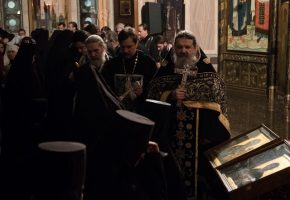The Lord condemned the Pharisee, not because he fasted, but because his motivation was based on pride. The Pharisee wished to be seen by men, and he had no fear of God. He dared to stand before the Lord in pride and arrogance, while the Publican stood afar off, beating his breast, begging for the Lord’s mercy. Whereas the Publican saw his sins, and repented, the Pharisee stood before the Lord in arrogance, thinking he was better than other men. He did not desire to commune with God, but to be honored by men.
As we observe the Great Lenten fast, let us imitate the Publican, who saw himself as the worst of sinners, and who begged God’s forgiveness. Let us keep the fast, not to be seen by others, but to make way for the Lord. Let us shun meat, dairy, and fish, because we love God, and desire to be drawn closer to Him, emptying ourselves of earthly pleasures.
Let us embrace the Fast as an opportunity for self-limitation, abstinence and self-emptying. Let us bear the cross in self-crucifixion, dying to self as we put on Christ. We dare not think we are Christians if we refuse to fast, for bearing our cross is the only way we can be true followers of Christ.
Let us embrace the fast, knowing, “fasting appears gloomy until one steps into its arena. But begin and you will see what light it brings after darkness, what freedom from bonds, what release after a burdensome life… (Saint Theophan the Recluse).”
Finally, let us be mindful that, “fasts and vigils, the study of Scripture, renouncing possessions and everything worldly are not in themselves perfection, as we have said; they are its tools. For perfection is not to be found in them; it is acquired through them. It is useless, therefore, to boast of our fasting, vigils, poverty, and reading of Scripture when we have not achieved the love of God and our fellow men. Whoever has achieved love has God within himself and his intellect is always with God (St John Cassian).”




















